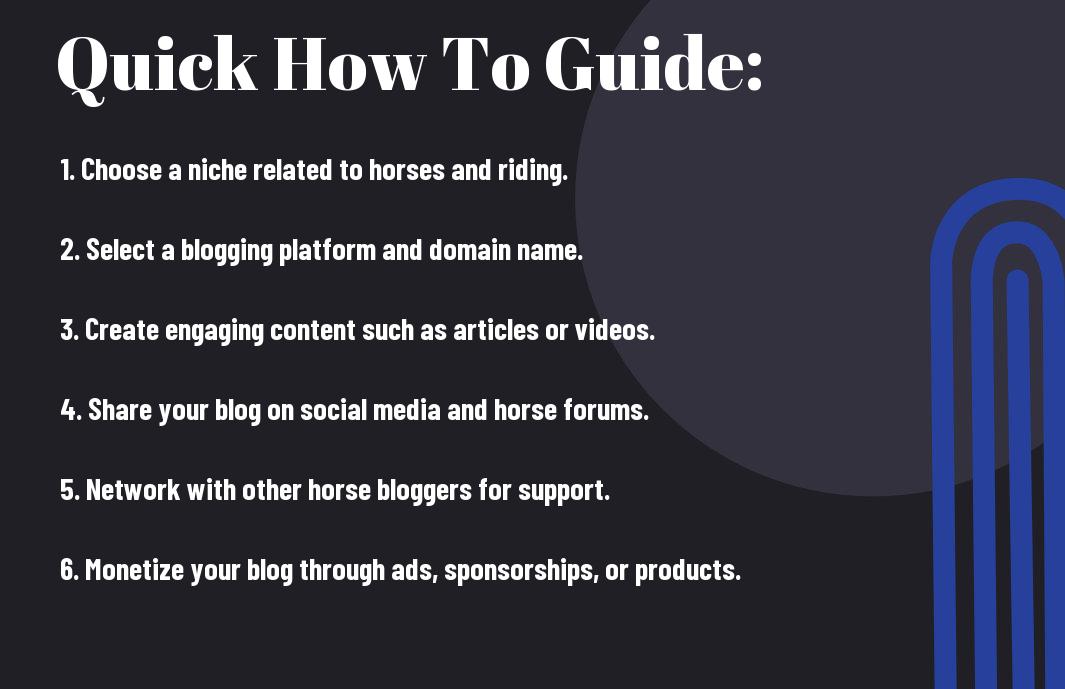This guide will help you kickstart your journey into the world of horse blogging. Whether you are a seasoned equestrian looking to share your knowledge or a beginner wanting to document your experiences, creating a horse blog can be a fulfilling venture. With the right approach, you can attract a dedicated audience, establish your online presence, and connect with fellow horse enthusiasts. Follow these tips to set up your blog and start sharing your passion for horses with the world.

Understanding Your Niche
While starting a horse blog can be an exciting venture, it’s important to understand your niche to effectively connect with your audience. Your niche is imperatively the specific area within the horse industry that you will be focusing on in your blog. This could be anything from horse care tips, training techniques, competitions, or even a combination of various horse-related topics. By understanding your niche, you can tailor your content to appeal to a specific group of readers who share the same interests and passion for horses as you do.
Identifying Your Target Audience
Niche: Identifying your target audience is crucial in determining the direction of your horse blog. Consider who you are writing for – are they experienced equestrians looking for advanced tips, or beginners seeking fundamental knowledge? Understanding your audience’s needs and interests will help you craft content that resonates with them. Whether your focus is on English riding, Western disciplines, or leisurely trail riding, knowing your target audience will guide the type of content you create.
Defining Your Unique Perspective
One: Defining your unique perspective sets your horse blog apart from the rest. What makes your writing style or approach distinctive? Maybe you have a particular training method that has shown success, or you offer a perspective on horse care that challenges traditional beliefs. Your unique perspective will attract readers who resonate with your views and keep them coming back for more.
Your insights, experiences, and opinions are what will make your horse blog stand out in a sea of similar content. Embrace what makes you different and use it to create engaging and authentic posts that will captivate your audience.

Setting Up Your Blog
Choosing the Right Platform
Any aspiring horse blogger must start by choosing the right platform for their blog. If you’re new to blogging, you may want to consider user-friendly platforms like WordPress or Blogger. These platforms offer easy-to-use interfaces and a wide range of customizable templates to help you create a professional-looking horse blog without any coding experience.
Registering a Domain Name
One important step in setting up your horse blog is registering a domain name. Your domain name is your blog’s web address, so it’s crucial to choose a name that is catchy, easy to remember, and relevant to your content. Consider using keywords related to horses or your niche to make it easier for visitors to find your blog.
Domain: A domain name gives your blog a professional touch and can help establish your brand in the horse blogging community. Make sure to choose a domain name that reflects your blog’s theme and is memorable to your audience.
Selecting a Web Host
For your horse blog to be accessible to the public, you’ll need to select a web host to store your blog’s files and make it available on the internet. When choosing a web host, consider factors like uptime, speed, security, and customer support. Look for hosting providers that offer reliable services specifically tailored to bloggers, ensuring your horse blog runs smoothly and efficiently.

Creating Engaging Content
Developing a Content Strategy
There’s no denying that developing a solid content strategy is crucial for the success of your horse blog. Before you start writing, take some time to think about your goals and target audience. Consider what type of content will resonate with your readers and how frequently you will post. Planning your topics ahead of time can help you stay organized and ensure a consistent flow of engaging posts.
Writing Compelling Headlines
Content is king, but if your headlines don’t grab your readers’ attention, they might not even get to your brilliant content. **Compelling headlines** are the first thing that your audience sees, so make them count. A good headline should be **enticing, concise, and relevant** to the content of your post. Take some time to craft catchy titles that will make readers want to click and explore more.
Content: Your headlines are like the gateway to your posts. They need to be compelling enough to entice readers to explore deeper into your content.
Compelling Well-Structured Posts
Some readers might skim through your posts, while others will read every word. **Crafting well-structured posts** ensures that both types of readers can easily navigate and digest your content. **Organize your posts with clear headings, subheadings, bullet points, and images** to break up the text and make it visually appealing. Your **introduction** should hook the reader, the **body** should provide valuable information, and the **conclusion** should leave them satisfied and wanting more.
It is important to remember that the way you present your content can have a significant impact on how it is received by your audience. By structuring your posts effectively, you can keep readers engaged and encourage them to come back for more.

Building Your Online Presence
Creating a Social Media Strategy
Keep in mind that in today’s digital age, having a strong social media presence is crucial for reaching a wide audience. With numerous platforms available, such as Instagram, Facebook, Twitter, and Pinterest, you have the opportunity to showcase your content and connect with fellow horse enthusiasts. To start, choose a few key platforms that align with your target audience and focus on creating engaging posts that highlight your passion for horses. Consistency is key, so make sure to post regularly and interact with your followers to build a loyal fan base.
Engaging with Your Audience
Online engagement is important for building a loyal following and establishing yourself as an authority in the equestrian community. Respond to comments, messages, and emails promptly to show your followers that you value their input. By fostering two-way communication, you can create a sense of community around your blog and make your audience feel heard and appreciated. Additionally, consider running polls, Q&A sessions, or contests to keep your audience engaged and invested in your content.
This is your chance to really connect with your audience and make them feel like they are part of your horse-loving community. By actively engaging with your followers, you can gain valuable insights, feedback, and ideas for future content, ultimately strengthening your online presence.
Collaborating with Other Horse Enthusiasts
Assuming you are just starting out, collaborating with other horse enthusiasts can be a game-changer for growing your blog and expanding your reach. Reach out to fellow bloggers, trainers, equine photographers, or riders and propose collaboration opportunities such as guest posting, joint social media campaigns, or hosting virtual events. Understanding that collaboration is mutually beneficial, as it exposes both parties to new audiences and provides fresh perspectives and expertise to your content.
Collaborating with other horse enthusiasts not only introduces you to new audiences but also helps you learn from others in the equestrian community, broadening your knowledge and network in the horse world.
Factors to Consider for Success
Despite your passion for horses and writing, there are several key factors to consider to ensure the success of your horse blog. Consistency and regular posting, search engine optimization (SEO), and building an email list are crucial elements that can help you grow your audience and establish your blog in the competitive online world.
Consistency and Regular Posting
If you want to attract and retain readers, consistency and regular posting are necessary. Your audience will come to expect new content from you, so it’s important to stick to a schedule and post fresh, engaging articles on a regular basis. This not only keeps your readers interested but also helps improve your blog’s visibility and credibility.
The key to success is to find a posting schedule that works for you and stick to it. Whether you choose to post daily, weekly, or bi-weekly, make sure you are consistent and reliable in delivering quality content to your audience. The more you post, the more opportunities you have to attract new readers and keep your current ones coming back for more.
The consistency in posting also helps search engines recognize your blog as active and relevant, which can improve your SEO rankings over time.
Search Engine Optimization (SEO)
Regularly optimizing your blog for search engines is crucial for increasing your visibility online. By incorporating relevant keywords related to horses, riding, and equine care into your blog posts, you can improve your chances of ranking higher in search engine results.
For instance, utilizing keywords like “horse care tips,” “equestrian training,” and “best horse breeds” strategically throughout your content can help you attract readers who are searching for information on these topics.
Building an Email List
If you want to establish a direct line of communication with your audience and keep them engaged with your blog, building an email list is necessary. Encourage your readers to subscribe to your newsletter or updates so that you can notify them about new blog posts, upcoming events, or exclusive content.
Understanding your audience’s preferences and interests can help you tailor your email content to better suit their needs, ultimately leading to higher engagement and loyalty.
Overcoming Common Challenges
Dealing with Writer’s Block
Writers, writer’s block is a common challenge that many face. When you find yourself struggling to come up with new ideas or feeling stuck in your writing process, **it** can be frustrating. **Here are some** tips to help you overcome writer’s block:
1. Take a break: Sometimes stepping away from your blog and taking a break can help you come back with a fresh perspective. **Go for a walk, relax**, or engage in other activities you enjoy to clear your mind.
Managing Time and Priorities
Managing your time and priorities is crucial when **it** comes to running a successful horse blog. **When** balancing writing, researching, **and** promoting your blog, **you** may find yourself overwhelmed. **Here are some** tips to help you manage **your** time effectively:
1. Create a schedule: **Set** aside specific **times** for writing, **responding** to comments, and promoting **your** blog on **social** media. **By** creating a **routine**, you can **better** manage **your** time **and** stay organized.
The key to effectively managing time is to prioritize tasks based on their importance and deadlines. **Make** a **to-do** list **each** day **and** tackle **the** most **important** tasks **first**. **This** will **help** you **stay** on track **and** ensure **that** you **are** **making** progress **in** **your** blogging **journey**.
Handling Criticism and Negative Feedback
If **you** **receive** **negative** feedback or face criticism **on** **your** blog, **it** can be **tough** to **deal** with. **Remember**, **not** **everyone** will **agree** with **your** opinions or **writing** style, **and** **that** is **okay**. **Here** **are** some **tips** to **handle** criticism **gracefully**:
1. Stay** **calm**: **When** faced **with** criticism, **take** a deep breath **and** **try** **to** **stay** calm. **Avoid** responding **immediately** **and** **take** **some** time **to** **process** **the** feedback **before** **responding**.
Summing up
From above tips, you now have a good idea of how to start your own horse blog. Remember to choose a niche that you are passionate about, research your topics thoroughly, and create engaging and valuable content for your readers. Be consistent in your posting schedule and use social media to promote your blog and connect with other equestrians. Don’t forget to interact with your audience and respond to comments to build a loyal following. With dedication and hard work, your horse blog can grow and become a valuable resource for horse enthusiasts.
FAQ
Q: Why should I start a horse blog?
A: Starting a horse blog allows you to share your passion for horses with a like-minded community, connect with other horse enthusiasts, and potentially create a platform for networking or even a source of income.
Q: Do I need to have experience in writing or blogging to start a horse blog?
A: While prior experience in writing or blogging can be helpful, it is not a requirement to start a horse blog. With dedication, research, and practice, anyone can learn how to write engaging content for a blog.
Q: What are some tips for creating engaging content for a horse blog?
A: To create engaging content for a horse blog, consider sharing personal stories, tips and advice, informational articles, interviews with experts, product reviews, and visually appealing photos or videos related to horses.
Q: How can I attract readers to my horse blog?
A: To attract readers to your horse blog, promote your content on social media platforms, join online horse communities and forums, collaborate with other bloggers or influencers in the horse industry, optimize your blog for search engines, and engage with your audience through comments and feedback.
Q: Can I monetize my horse blog?
A: Yes, you can monetize your horse blog through various strategies such as affiliate marketing, sponsored posts, selling digital or physical products related to horses, offering online courses or consultations, and utilizing advertising networks. However, building a loyal readership and high-quality content are key to successful monetization.










